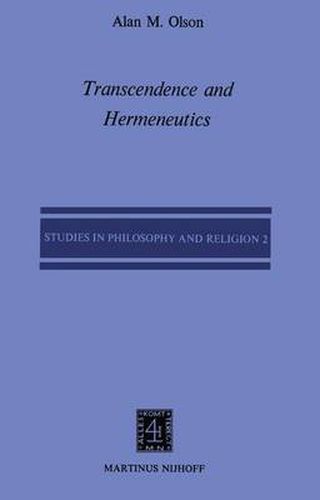Readings Newsletter
Become a Readings Member to make your shopping experience even easier.
Sign in or sign up for free!
You’re not far away from qualifying for FREE standard shipping within Australia
You’ve qualified for FREE standard shipping within Australia
The cart is loading…






This title is printed to order. This book may have been self-published. If so, we cannot guarantee the quality of the content. In the main most books will have gone through the editing process however some may not. We therefore suggest that you be aware of this before ordering this book. If in doubt check either the author or publisher’s details as we are unable to accept any returns unless they are faulty. Please contact us if you have any questions.
“The problem of Transcendence is the problem of our time.
I Needless to say, Transcendence was a particularly lively i~sue when Karl Heim wrote these words in the mid-1930’s. Within the province of philosophi cal theology and philosophy of religion, however, it is always the prob lem, as Gordon Kaufman has recently reminded us. 2Por the question concerning the nature and the reality of Transcendence has not only to do with self-transcendence, but with the being of Transcendence-Itself, that is to say, with the nature and the reality of God as experienced and understood at any given time or place. Now there are those today who would claim that any further discus sion of the latter half of this proposition, namely,Transcendence-Itse1f or God, is worthless and quite beside the point. Such persons would claim that the particular logia represented by the theological sciences has collapsed by virtue of its object having disappeared. Indeed, when one surveys the contemporary scene in philosophy and theology, there is a good deal of evidence that this is the case’:
theology of late having be come something of a spectacle, to use Pritz Buri’s term. One of the reasons for this, we here contend, is that the richness and the diversity of the meaning of Transcendence has been lost. And even though we do not here intend to resolve the issue, neither do we assume that such an enqui ry is either impossible or irrelevant.
$9.00 standard shipping within Australia
FREE standard shipping within Australia for orders over $100.00
Express & International shipping calculated at checkout
Stock availability can be subject to change without notice. We recommend calling the shop or contacting our online team to check availability of low stock items. Please see our Shopping Online page for more details.
This title is printed to order. This book may have been self-published. If so, we cannot guarantee the quality of the content. In the main most books will have gone through the editing process however some may not. We therefore suggest that you be aware of this before ordering this book. If in doubt check either the author or publisher’s details as we are unable to accept any returns unless they are faulty. Please contact us if you have any questions.
“The problem of Transcendence is the problem of our time.
I Needless to say, Transcendence was a particularly lively i~sue when Karl Heim wrote these words in the mid-1930’s. Within the province of philosophi cal theology and philosophy of religion, however, it is always the prob lem, as Gordon Kaufman has recently reminded us. 2Por the question concerning the nature and the reality of Transcendence has not only to do with self-transcendence, but with the being of Transcendence-Itself, that is to say, with the nature and the reality of God as experienced and understood at any given time or place. Now there are those today who would claim that any further discus sion of the latter half of this proposition, namely,Transcendence-Itse1f or God, is worthless and quite beside the point. Such persons would claim that the particular logia represented by the theological sciences has collapsed by virtue of its object having disappeared. Indeed, when one surveys the contemporary scene in philosophy and theology, there is a good deal of evidence that this is the case’:
theology of late having be come something of a spectacle, to use Pritz Buri’s term. One of the reasons for this, we here contend, is that the richness and the diversity of the meaning of Transcendence has been lost. And even though we do not here intend to resolve the issue, neither do we assume that such an enqui ry is either impossible or irrelevant.